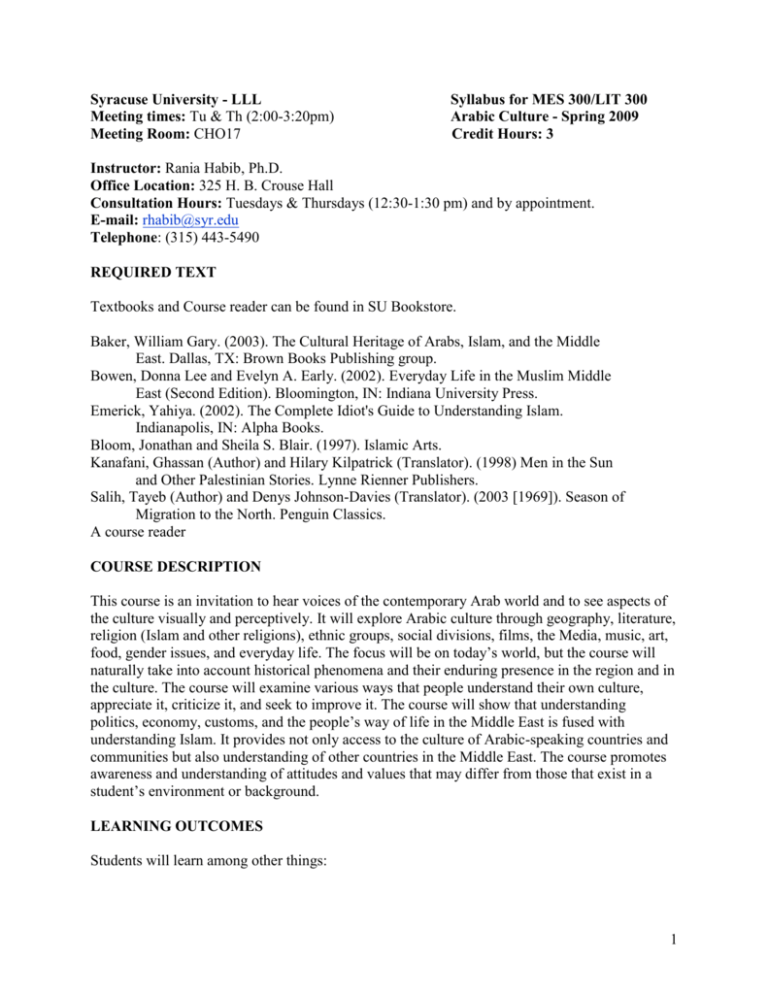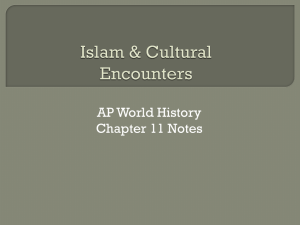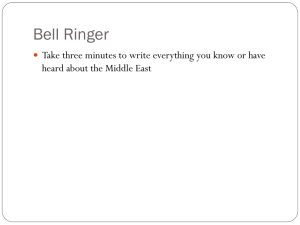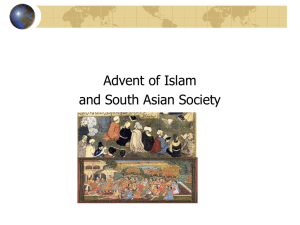View Syllabus. - Syracuse University
advertisement

Syracuse University - LLL Meeting times: Tu & Th (2:00-3:20pm) Meeting Room: CHO17 Syllabus for MES 300/LIT 300 Arabic Culture - Spring 2009 Credit Hours: 3 Instructor: Rania Habib, Ph.D. Office Location: 325 H. B. Crouse Hall Consultation Hours: Tuesdays & Thursdays (12:30-1:30 pm) and by appointment. E-mail: rhabib@syr.edu Telephone: (315) 443-5490 REQUIRED TEXT Textbooks and Course reader can be found in SU Bookstore. Baker, William Gary. (2003). The Cultural Heritage of Arabs, Islam, and the Middle East. Dallas, TX: Brown Books Publishing group. Bowen, Donna Lee and Evelyn A. Early. (2002). Everyday Life in the Muslim Middle East (Second Edition). Bloomington, IN: Indiana University Press. Emerick, Yahiya. (2002). The Complete Idiot's Guide to Understanding Islam. Indianapolis, IN: Alpha Books. Bloom, Jonathan and Sheila S. Blair. (1997). Islamic Arts. Kanafani, Ghassan (Author) and Hilary Kilpatrick (Translator). (1998) Men in the Sun and Other Palestinian Stories. Lynne Rienner Publishers. Salih, Tayeb (Author) and Denys Johnson-Davies (Translator). (2003 [1969]). Season of Migration to the North. Penguin Classics. A course reader COURSE DESCRIPTION This course is an invitation to hear voices of the contemporary Arab world and to see aspects of the culture visually and perceptively. It will explore Arabic culture through geography, literature, religion (Islam and other religions), ethnic groups, social divisions, films, the Media, music, art, food, gender issues, and everyday life. The focus will be on today’s world, but the course will naturally take into account historical phenomena and their enduring presence in the region and in the culture. The course will examine various ways that people understand their own culture, appreciate it, criticize it, and seek to improve it. The course will show that understanding politics, economy, customs, and the people’s way of life in the Middle East is fused with understanding Islam. It provides not only access to the culture of Arabic-speaking countries and communities but also understanding of other countries in the Middle East. The course promotes awareness and understanding of attitudes and values that may differ from those that exist in a student’s environment or background. LEARNING OUTCOMES Students will learn among other things: 1 1. The three major social division in the Arab World: urban, rural, and Bedouin. 2. The geography and history of the political divisions in the region. 3. The influence of Islam on customs, traditions, and everyday life. 4. Gender roles and differences. 5. Social customs: marriage, divorce, visiting, dating, the veil/head scarf, etc. 6. Taboos and gestures in the Arab World. 7. The different religious practices and holidays. 8. About Middle Eastern music and art 9. About the literary tradition of the area 10. How the Media such as TV, internet, etc. are utilized in the Arab World. LEARNING OBJECTIVES Not only will the students learn many aspects about the Middle East, but they are expected to achieve the following objectives: 1. At the conclusion of the course, each student will find his/her own individual way of appreciating Arabic culture, of communicating with people from this culture, and communicating what s/he has learned to others from his/her own culture. 2. Students will learn about many aspects of Arabic culture that not only allow them to interact successfully with people from that culture, but also to change and modify preconceived misconceptions and stereotypes about the Middle East. 3. Students will have the necessary knowledge that enables them to find employment in a wide array of fields requiring knowledge of Arabic culture and the ability to understand and adapt to different cultures. This knowledge will also enable them to pursue advanced studies in related fields such as religion, communication, public relations, international relations, political science, journalism, etc. COURSE REQUIREMENTS This is a Gordon Rule 4,000-word course, which means you will be writing approximately 16 pages in total throughout the course. This will be in the form of 3 critical reflective essays and one short story of your own creation about one aspect of the Arab culture of your choice. All written assignments must be typed and should be double-spaced with 1” margins and 12 points font. Written work will be evaluated on the effectiveness, organization, clarity, and coherence of the writing as well as the grammar, punctuation, and usage of standard written English. Critical Essays: The purpose of these critical reflective essays is to synthesize course readings, in-class discussions, and other sources. Each essay should be no more that 1000 words in length- this exercise challenges you to write clearly and concisely. Our required texts are the work of living authors, and the reception of their writing continues to be informed by readers', reviewers', and scholars' feedback. Your critical essay could be related to a certain topic or text we covered in 2 class. Support your comments, questions, and suggestions with specific examples from the primary and secondary texts to indicate that you have read thoroughly and critically. Your critical essay should reflect on your learning expectations, questions addressed, and issues raised in relation to the reading as well as your own opinion and comments. In other words, "How has the reading impacted your thinking?" You are required to include the following in each of your critical essays: 1. at least five Arabic words that are related to your topic 2. at least three citations that support the facts presented in your essay Short Story The short story should be no more than 1000 words in length. This project requires you to select a topic of your interest related to Arabic culture. You have to create a short story that deals with this specific topic. Try to be innovative and creative (e.g. you could include dialogue among characters to reach at a certain fact that describes your topic without stating it explicitly). You are required to include the following in your short story: 3. at least five Arabic words that are related to the story 4. at least three citations that support the facts presented in your story Late assignment policy: NO late assignments will be accepted. Assignments will not be accepted via electronic means except under extraordinary circumstances and with prior approval from the Instructor. Expected Time Required (Approximate): On average, you should plan to dedicate roughly 2-3 hours of outside time and effort per hour spent in class. Readings Reading assignments from the required textbooks should be completed by all students before the lecture that they are assigned for in the schedule (see the attendance policy below). For each class session, 1 or 2 students will be asked to do more intensive preparation. They could work together on presenting the assigned reading in class. Their presentation should be about 20-30 minutes in which they highlight the main points of the text. They should also come up with at least 5 questions and 5 observations to simulate discussion in class. They could also use outside resources to enhance their presentation. This activity is part of your participation grade. POLICIES Attendance Our class is a learning community, and your presence is essential at all sessions. For each class discussion, bring one written cultural observation and one written question about the assigned readings and submit them at the beginning of class. These observations and questions will help develop our discussion along the paths you are interested in. These observations and questions will not only serve as a means for taking attendance but also as part of your class participation grade (see Assessment & Grading below). For each missed class, 3 points will be deducted from the 100 points that are allocated for class participation. Note that if reading is not assigned and 3 we are viewing a movie or doing some other activity, you are still required to attend to take notes and present one question and one observation at the end of the session. We may discuss these questions and observations in other sessions and you may be asked to write a summary or commentary about the presented material. Students with Special Needs Students who are in need of disability-related academic accommodations must register with the Office of Disability Services (ODS), 804 University Avenue, Room 309, 315-443-4498. Students with authorized disability-related accommodations should provide a current Accommodation Authorization Letter from ODS to the instructor and review those accommodations with the instructor. Accommodations, such as exam administration, are not provided retroactively; therefore, planning for accommodations as early as possible is necessary. For further information, see the ODS website, Office of Disability Services http://disabilityservices.syr.edu/ Academic Integrity The Syracuse University Academic Integrity Policy holds students accountable for the integrity of the work they submit. Students should be familiar with the Policy and know that it is their responsibility to learn about instructor and general academic expectations with regard to proper citation of sources in written work. The policy also governs the integrity of work submitted in exams and assignments as well as the veracity of signatures on attendance sheets and other verifications of participation in class activities. Serious sanctions can result from academic dishonesty of any sort. For more information and the complete policy, see http://academicintegrity.syr.edu Disagreements and Grade Disputes If you disagree with a grade or have problems in your class, please approach me as soon as possible and try to solve the disagreement together. Please do not wait until the end of the semester (when it is really too late) to try to resolve any problems. If you find yourself struggling with the material, please see me as soon as you can – do not wait until it is too late! Cell Phones Turn off your cell phones before lectures begin. In the case of extenuating circumstances, let the Instructor know before the lecture begins that you need your cell phone turned on. Assessment & Grading Your grade will be determined on the basis of grades for assignments and participation, with the following breakdown: Critical Essays 20% each (100 points each: 300 total) Short Story 20% (100 points) Class Participation 20% (100 points) 4 Grade Scale Letter grades will be assigned by the following scale: A 95.0-100 C+ 77.0-79.9 A- 90.0-94.9 C 74.0-76.9 B+ 87.0-89.9 C- 70.0-73.9 B 84.0-86.9 D 60.0-69.9 B- 80.0-83.9 F ≤ 59.9 GRADES WILL NOT BE CURVED. SCHEDULE OF TOPICS AND ASSIGNMENTS This schedule is tentative and subject to change. Changes will be announced in class and/or on the course webpage. Thursday Tuesday week 1: 1/13 – 1/15 Introduction, Poem by Nizar Kabbani week 2: 1/20 – 1/22 Course Reader: Halim Barakat: (Religion in society) & Yambert: (The Middle East) week 3: 1/27-1/29 Course Reader: Rahman: (God) & (from Man in Society). Schimmel: (Muhammad’s unique position) & (The light of Muhammad and the mystical tradition) Emerick: The Complete Idiot’s Guide to Understanding Islam: Part 4: Islam and Other Religions. week 4: 2/3 – 2/5 Course Reader: Halim Barakat: (The continuity of old cleavage: Tripe, village, city) & (The Arab family and the challenge of change) Course Reader: Yambert: (Peoples and Cultures of the Middle East), and (The Roots of Arab bitterness) Emerick: The Complete Idiot’s Guide to Understanding Islam: Part 3: The Five Pillars of Islam Film: Will be announced Bowen & Early: Everyday Life in the Muslim Middle East: Chapter 14: The Veiled Revolution First Critical Essay Due week 5: 2/10 – 2/12 week 6: 2/17 – 2/19 week 7: 2/24 – 2/26 Emerick: The Complete Idiot’s Guide to Understanding Islam: Part 5: Regulating Life within the Laws of Islam. Ghassan Kanafani: Men in the Sun Course Reader: Cooke: Middle Eastern Literature Bloom & Blair: Islamic Arts: Chapter 1: Mosques, Mansions, and Mosaic Bloom & Blair: Islamic Arts: Chapter 2: Pens and Parchment Ghassan Kanafani: Men in the Sun 5 week 8: 3/3 – 3/5 week 9: 3/10 – 3/12 week 10: 3/17 – 3/19 week 11: 3/24 – 3/26 week 12: 3/31 – 4/2 week 13: 4/7 – 4/9 week 14: 4/14 – 4/16 week 15: 4/21 – 4/23 week 16: 4/28 Tuesday Bloom & Blair: Islamic Arts: Chapter 3 (Draped Universe) & Chapte 5 (Madrasas and Muqarnas) Spring Break Bowen & Early: Everyday Life in the Muslim Middle East: Chapter 9 (Young women’s sexuality in Tunisia) & Chapter 17 (Fashioning Casablanca in the beauty salon) Bowen & Early: Everyday Life in the Muslim Middle East: Chapter 16 (Abortion and the ethics of life) & Chapter 18 (Chalk and Dust: Teachers’ lives in rural Sudan) Bowen & Early: Everyday Life in the Muslim Middle East: Chapter 22 (Inside the Islamic reformation) & Chapter 29 (Internet Islam: New Media of the Islamic reformation) Course Reader: Kraidy: Idioms of contention: Star Academy in Lebanon and Kuwait. Bowen & Early: Everyday Life in the Muslim Middle East: Chapter 30: Syrian television drama: permitted political discourse Course Reader: Karam: Satellite Television: A breathing space for Arab youth? Bowen & Early: Everyday Life in the Muslim Middle East: Chapter 32: Moroccan filmmaking: a long voyage through the straits of paradox NO CLASS: Mayfest Thursday Film: Will be announced Second Critical Essay Due Spring Break Bowen & Early: Everyday Life in the Muslim Middle East: Chapter 11 (Harasiis Marriage, divorce, and companionship) & Chapter 12 (Oil, fertility, and women’ status in Oman) Bowen & Early: Everyday Life in the Muslim Middle East: Chapter 19 (Networks, jobs, and everyday life in Cairo) Chapter 28 (Islamic Teaching among Sunni women in Syria) Baker: Arabs, Islam, and the Middle East: Chapters 5 (Social interaction), 6 (Social etiquette), & 7 (Doing Business in the Arab World) Course Reader: Hofheinz: Arab Internet Use: Popular trends and public impact. Bowen & Early: Everyday Life in the Muslim Middle East: Chapter 31: The riddle of Ramadan: Media, consumer culture, and the “Christmasization” of a Muslim holiday Third Critical Essay Due Course Reader: Asmar & Hood: Modern Arab Music: Portraits of enchantment from the middle Generation Tayeb Salih: Season of Migration to the North Tayeb Salih: Season of Migration to the North Short Story Due 6









